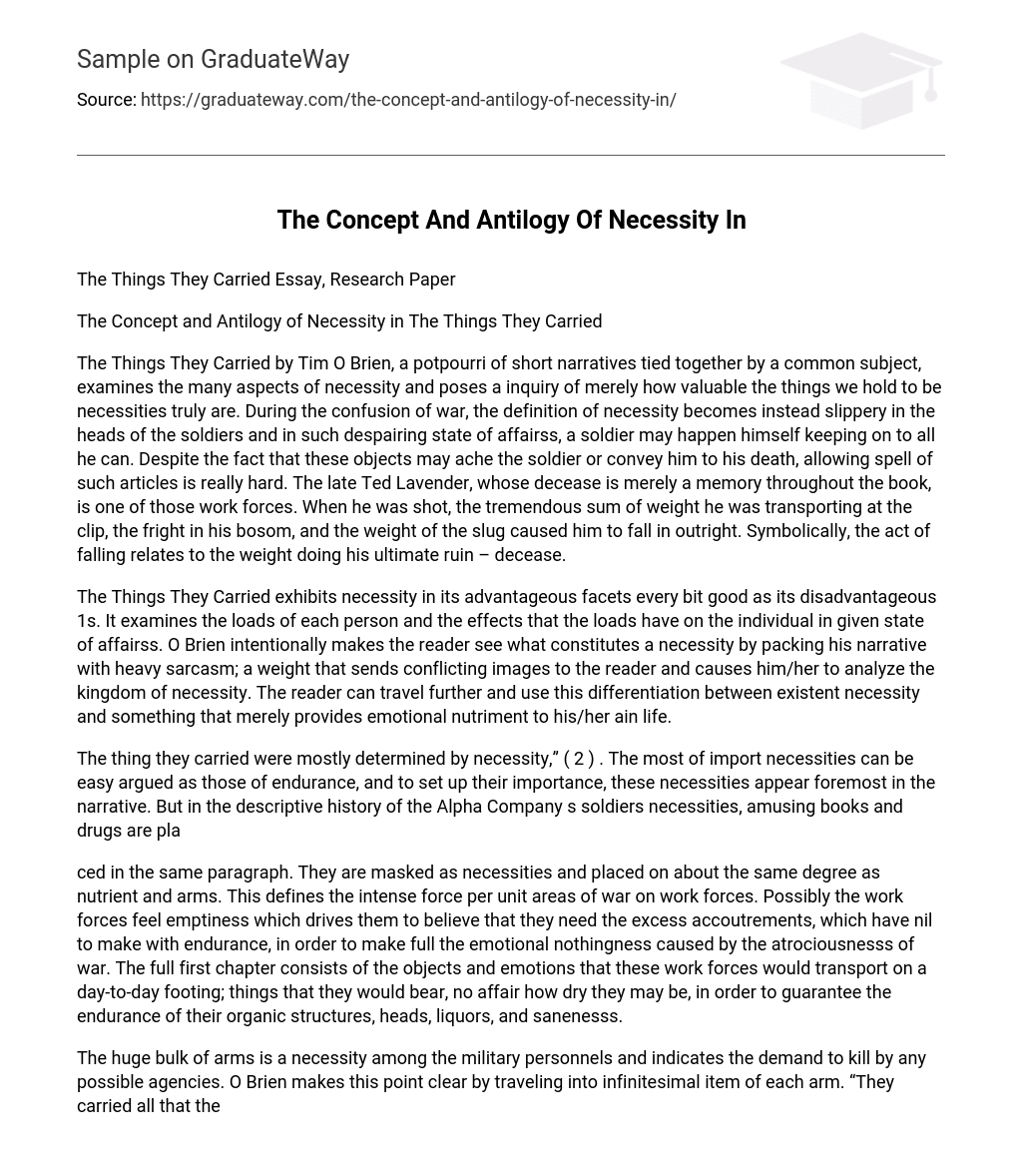The Things They Carried by Tim O Brien, a potpourri of short narratives tied together by a common subject, examines the many aspects of necessity and poses a inquiry of merely how valuable the things we hold to be necessities truly are. During the confusion of war, the definition of necessity becomes instead slippery in the heads of the soldiers and in such despairing state of affairss, a soldier may happen himself keeping on to all he can. Despite the fact that these objects may ache the soldier or convey him to his death, allowing spell of such articles is really hard.
The late Ted Lavender, whose decease is merely a memory throughout the book, is one of those work forces. When he was shot, the tremendous sum of weight he was transporting at the clip, the fright in his bosom, and the weight of the slug caused him to fall in outright. Symbolically, the act of falling relates to the weight doing his ultimate ruin – decease.
The Things They Carried exhibits necessity in its advantageous facets every bit good as its disadvantageous 1s. It examines the loads of each person and the effects that the loads have on the individual in given state of affairss. O Brien intentionally makes the reader see what constitutes a necessity by packing his narrative with heavy sarcasm; a weight that sends conflicting images to the reader and causes him/her to analyze the kingdom of necessity. The reader can travel further and use this differentiation between existent necessity and something that merely provides emotional nutriment to his/her ain life.
The thing they carried were mostly determined by necessity,” ( 2 ) . The most of import necessities can be easy argued as those of endurance, and to set up their importance, these necessities appear foremost in the narrative. But in the descriptive history of the Alpha Company s soldiers necessities, amusing books and drugs are placed in the same paragraph. They are masked as necessities and placed on about the same degree as nutrient and arms. This defines the intense force per unit areas of war on work forces.
Possibly the work forces feel emptiness which drives them to believe that they need the excess accoutrements, which have nil to make with endurance, in order to make full the emotional nothingness caused by the atrociousnesss of war. The full first chapter consists of the objects and emotions that these work forces would transport on a day-to-day footing; things that they would bear, no affair how dry they may be, in order to guarantee the endurance of their organic structures, heads, liquors, and sanenesss.
The huge bulk of arms is a necessity among the military personnels and indicates the demand to kill by any possible agencies. O Brien makes this point clear by traveling into infinitesimal item of each arm. “They carried all that they could bear, and so some, including a soundless awe for the awful power of the things they carried.” ( 9 )
Possibly the greatest burden of all, that the work forces feel necessary to transport, is the weightless, internal burden called self-respect. There is an mute demand to remain tough buried among the work forces and non allowing the numbingly hideous force of the war interruption through to the surface. At the most unsafe times, this would demo, but it would non last long for the work forces would rapidly cover it up. They would make this by looking at decease in a humourous manner as if to destruct the world of decease itself” ( 19-20 ) .
Sometimes, the work forces would kill and decease because they were embarrassed non to. They would merely let themselves to woolgather of freedom, non truly sing it as a possibility, for those who would take the easy manner out by wounding themselves, were looked upon with disdain. This is despite some hints of green-eyed monster that remain inside them. These descriptions may give the semblance that these internal burdens the work forces carry are maintaining them alive, are necessary. Yet, in visible radiation of Lavender s decease, this could barely be the instance.





